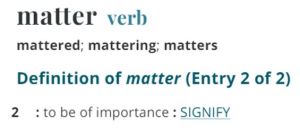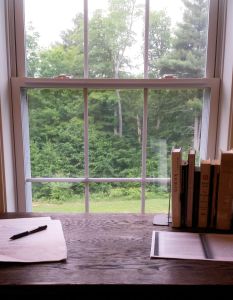
I am struck by the simple beauty and truth of the sentence, “Black lives matter.” I am also struck by the nonsense of the too-common rejoinder “All lives matter” as any kind of answer. That “reply” is a failure in many ways—empathy, political and historical knowledge, humanity, morality – but also simply a failure of language.
“Black lives matter” is a modest, and yet a radical, claim. Modest because “matter” in such a statement never means “Only (this) matters.” Radical because having to say that something important “matters” implies a forgotten, or a never recognized, “too.” Taking nothing away from anyone, it simply claims inclusion for what had, demonstrably, not been thought to matter. “Matter” in this context always implies “too.” Not understanding that means not understanding what “matter” means. Black lives matter, too. Hey, people: Black lives matter too!
The thing is, if you are the one whose life has the presumption of mattering, no assertion is necessary. You don’t even need to think about it, it just is. Before the #BlackLivesMatter movement, who ever heard anyone saying “All lives matter”? Besides the obvious hypocrisy of that statement, which has been pointed out elsewhere, as a response to “Black lives matter” it’s dismissive, it’s ignorant, and it’s linguistically inane.
A relationship is not good, or whole, if only one person’s needs matter, worse if that person is oblivious to the fact. It is not good for either party. A country and a society is not good, or whole, if only those who have always presumed they mattered – without giving it a thought – matter.
Another word in the sentence that is perfectly chosen and must be heard is “lives.” Not “people.” This is not a claim about Black people. It is a claim about Black lives. Because, as we have seen in the last weeks, and, if we care to look, the last years, decades, and centuries, it is Black lives that are at stake.
I hasten to say that I am not trying to explain the movement itself, something for which I am neither qualified nor needed; founders Patrisse Khan-Cullors, Alicia Garza, and Opal Tometi (you can read their impressive biographies here) and others in the movement have done that and continue doing it every day. I am simply awed by their brilliance in creating the simple, powerful, world-changing statement “Black lives matter.” As a poet, I hear it as poetry, but poetry that has and will continue to make something happen. Starting with our hearing what it really means. And answering without being fools.
Lastly, for anyone still thinking there is anything narrow about “Black lives matter,” check out what the movement is doing in 2020, here. This movement is good for all of us. Odd, isn’t it, that “Black lives matter” turns out to be much more genuinely inclusive than the insincere and facile “All lives matter”?
From the Black Lives Matter website: BLM’s #WhatMatters2020 will focus on issues concerning racial injustice, police brutality, criminal justice reform, Black immigration, economic injustice, LGBTQIA+ and human rights, environmental injustice, access to healthcare, access to quality education, and voting rights and suppression.
This initiative will inspire and motivate people to ask themselves and their candidates, are you really addressing What Matters in 2020?

